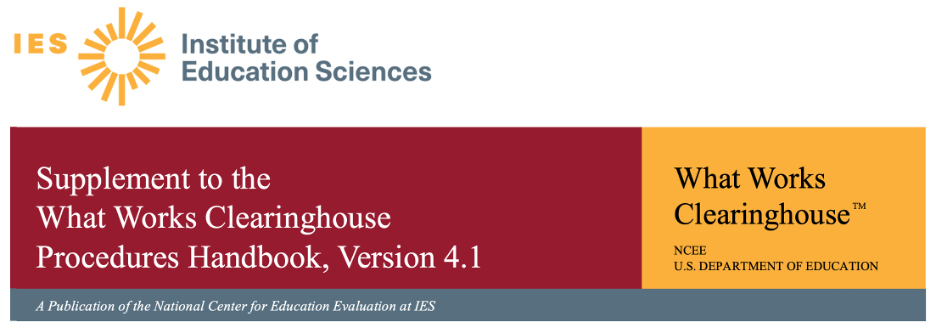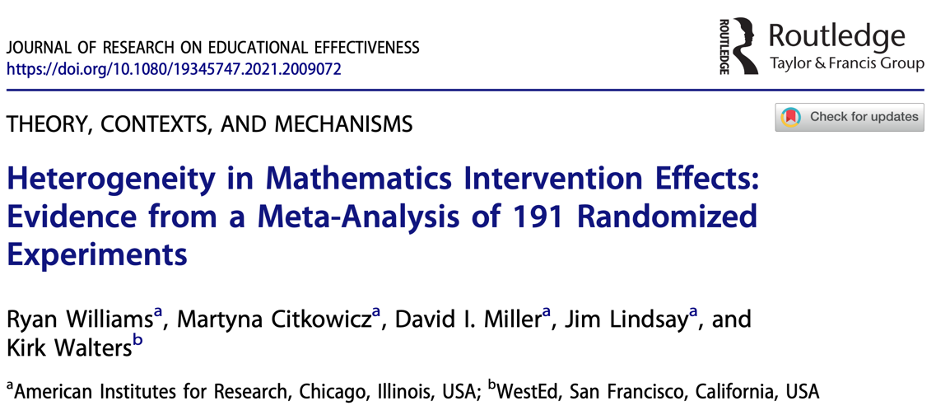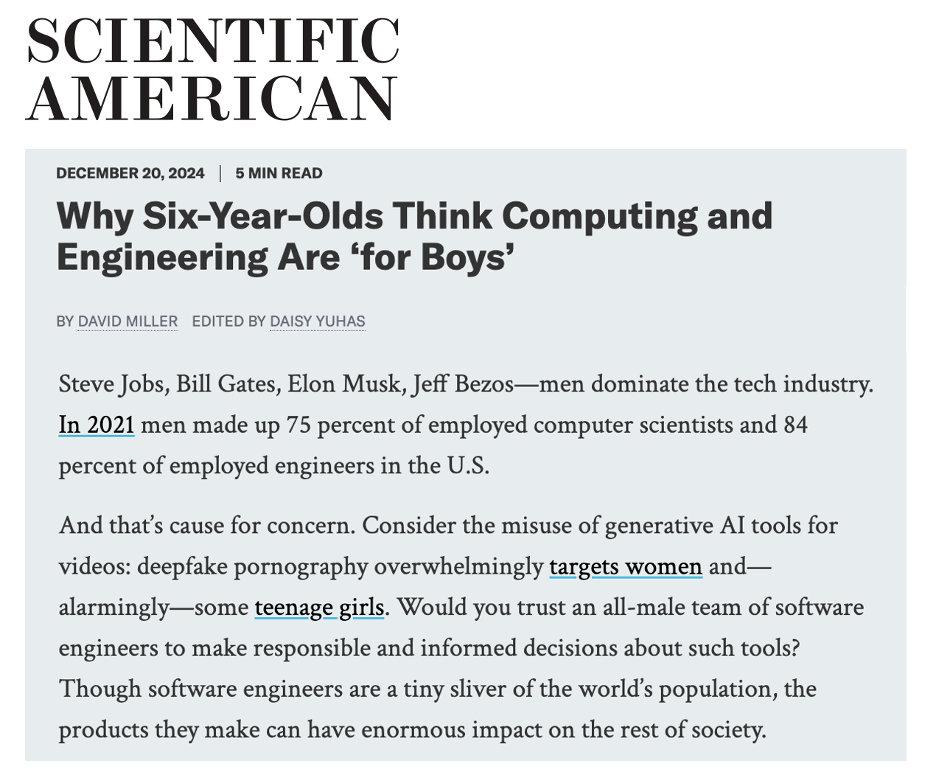My past and current work falls along three major lines of research:
- Line 1: Understanding gender gaps in STEM using large-scale data.
- Line 2: Advancing methodological innovation in education and psychology research.
- Line 3: Improving STEM learning using syntheses, educational technology, and spatial training.
A fourth category includes popular press articles for disseminating findings to the public.
Line 1: Gender Gaps in STEM
☝️ Representative publication
Nater, C., Miller, D. I., Eagly, A. H., & Sczesny, S. (under review). Gender stereotypes across nations reflect the social roles of women and men: Evidence from public opinion polls from 1995 and 2023.
- Not STEM-focused, but grouped here given the gender and large-scale data focus.
[PDF] Miller, D. I., Lauer, J. E., Tanenbaum, C., & Burr, L. (2024). The development of children’s gender stereotypes about STEM and verbal abilities: A preregistered meta-analytic review of 98 studies. Psychological Bulletin, 150(12), 1363–1396. [R code/data, preregistration, and interactive app]
- Selected as Editor’s Choice for the December 2024 issue of Psychological Bulletin (impact factor = 17.3).
- Guided by a detailed, 76-page preregistration.
- The OSF repository includes the R analysis code and R Markdown code to reproduce all tables, all figures, and all text in the results section.
- Profiled by the National Science Foundation.
- First publication from my first NSF grant as lead PI (other publications from that grant are in preparation).
- Media coverage (selected): Education Week, Forbes, Mashable, NPR, Scientific American, The 74, and republishing across several local news outlets with this Talker News article.
[PDF] Eagly, A. H., Nater, C., Miller, D. I., Kaufmann, M., & Sczesny, S. (2020). Gender stereotypes have changed: A cross-temporal meta-analysis of U.S. public opinion polls from 1946 to 2018. American Psychologist, 75(3), 301–315. [R code/data]
- Not STEM-focused, but grouped here given its gender and meta-analysis focus.
- I was the lead analyst and R coder for this meta-analysis.
- 1,200+ citations according to Google Scholar.
- Media coverage (selected): Business Insider, Los Angeles Times, New York Times, Newsweek, Pacific Standard Magazine, Psychology Today, USA Today
[PDF] Miller, D. I., Nolla, K. M., Eagly, A. H., & Uttal, D. H. (2018). The development of children’s gender-science stereotypes: A meta-analysis of five decades of U.S. Draw-A-Scientist studies. Child Development, 89(6), 1943-1955. [R code/data]
- 500+ citations according to Google Scholar.
- My writing: I wrote this article in Scientific American about the study.
- Media coverage (selected): ABC News, BBC News, Chicago Tribune, CNET, CNN, Education Week, Fortune, Mashable, Nature, NBC News, New York Times, Newsweek, Science, Science News, Smithsonian, TIME, The Atlantic, Washington Post, and World Economic Forum
- I was also interviewed twice on radio for BBC World Service
- The study also received national TV coverage on ABC News (see 16-second clip here).
- The syndicated news company, Ivanhoe Broadcast News, produced a 90-second TV news clip for an initiative that reached more than 40 million viewers on average.
[PDF] Miller, D. I. (2016). Sex difference research and cognitive abilities. In N. A. Naples (Ed.), The Wiley-Blackwell Encyclopedia of Gender and Sexuality Studies. New York, NY: John Wiley & Sons, Ltd.
[PDF] Eagly, A. H., & Miller, D. I. (2016). Scientific eminence: Where are the women? Perspectives in Psychological Science, 11, 899-904.
[PDF] Miller, D. I., Eagly, A. H., & Linn, M. C. (2015). Women’s representation in science predicts national gender-science stereotypes: Evidence from 66 nations. Journal of Educational Psychology, 107, 631-644. [R code/data]
- 650+ citations according to Google Scholar.
- Profiled by Science magazine (over 2,300 Facebook shares)
- My writing: I wrote this popular press article about the study for The Conversation.
- Media coverage (selected): APA Monitor, Ars Technica, Business Standard (Indian outlet), Dutch News (Dutch outlet), eldario.es (Spanish outlet; written in Spanish), LabOnline (Australian outlet), Northwestern University (press release), Ozy, Pacific Standard, Quartz, scientias.nl (Dutch outlet; written in Dutch), The New Zealand Herald (New Zealand outlet), U.S. News, Yahoo News
[PDF] Miller, D. I., & Wai, J. (2015). The bachelor’s to Ph.D. STEM pipeline no longer leaks more women than men: A 30-year analysis. Frontiers in Psychology, 6, 36. [R code/data]
- Profiled by Nature News (over 3,500 Facebook shares)
- My writing: I wrote this op-ed for Inside Higher Ed about why we should end the “leaky pipeline” metaphor for explaining the low numbers of women in science and engineering.
- Media coverage (selected): Chicago Tribune, Live Science, Northwestern University (press release), Quartz, Science, The Guardian, U.S. News, Yahoo News
[PDF] Miller, D. I., & Halpern, D. F. (2014). The new science of cognitive sex differences. Trends in Cognitive Sciences, 18, 37-45.
- 750+ citations according to Google Scholar.
[PDF] Miller, D. I., & Halpern, D. F. (2013). Can spatial training improve long-term outcomes for gifted STEM undergraduates? Learning and Individual Differences, 26, 141-152.
- Listed here for studying gender gaps in spatial skills and physics outcomes (also cross-listed under Line 3).
- 200+ citations according to Google Scholar.
- Media coverage: Association for Psychological Science Observer, Psychology Today
Line 2: Methodological Innovation
☝️ Representative publication (I was the lead author, see the note below)
Miller, D. I. (under review). Power for moderator tests in modern meta-analyses: A simulation-based approach.
- Developed a simulation-based approach for estimating the power of moderator tests in modern meta-analyses that use multiple-moderator models and include multiple effect sizes per study.
- See page 1374 of the Psychological Bulletin article or Appendix E of the preregistration for what this manuscript will describe and contextualize in further detail.
[PDF] Hall, J. A., & Miller, D. I. (2024). Meta-analysis. In H. T. Reis, T. West, & C. M. Judd (Eds.), Handbook of Research Methods in Social and Personality Psychology (pp. 678-704). Cambridge University Press.
- Target audience: Doctoral students in social and personality psychology who want to start a meta-analysis (but haven’t done one yet) or want to be an intelligent consumer of published meta-analyses.
[PDF] Williams, R., Citkowicz, M., Miller, D. I., Lindsay, J., & Walters, K. (2022). Heterogeneity in mathematics intervention effects: Evidence from a meta-analysis of 191 randomized experiments. Journal of Research on Educational Effectiveness, 15(3), 584-634. [R code/data and interactive app]
- Listed here for using random forests to explore effect heterogeneity (also cross-listed under Line 3).
- Was the lead data analyst and R coder, leveraging my meta-analysis and machine learning expertise.
- Implemented mixed-effects meta-regression models using the metafor R package.
- Applied robust variance estimation (RVE), using the correlated hierarchical effects (CHE) working model and clubSandwich R package, following the latest recommendations from Pustejovsky and Tipton (2022).
- Used multiple imputation to account for missing moderator data (see R code here), while using the jomo R package to account for the multilevel data in the imputation process (effect sizes nested within studies).
[PDF] What Works Clearinghouse. (2022). What Works Clearinghouse procedures and standards handbook, version 5.0. U.S. Department of Education, Institute of Education Sciences, National Center for Education Evaluation and Regional Assistance (NCEE).
- I led the direction for recommending changes to Appendices D and E on statistical formulas for the What Works Clearinghouse (WWC), in close partnership with Ryan Williams, Qi Zhang, Larry Hedges, and contracting officers at the Institute of Education Sciences (IES).
- I also drafted Appendices D–F, oversaw the revisions of text for all other technical appendices, and drafted the sections on standards for cluster-level assignment studies (pages 42-52 and 59-63).
- Those sections (and the entire WWC handbook) were closely peer-reviewed by members of the What Works Clearinghouse’s Statistical, Technical, and Analysis Team.
[PDF] What Works Clearinghouse. (2020). Supplement to the What Works Clearinghouse procedures handbook, version 4.1. U.S. Department of Education, Institute of Education Sciences, National Center for Education Evaluation and Regional Assistance (NCEE).
- I drafted and revised this official What Works Clearinghouse (WWC) supplement, in close partnership with Ryan Williams, Larry Hedges, and contracting officers at the Institute of Education Sciences (IES).
- (The document itself does not list specific authors due to the nature of the federal contract.)
- Introduced new standard error equations for effect sizes based on adjusted mean differences.
- Was peer-reviewed by members of the WWC’s Statistical, Technical, and Analysis Team (STAT).
- For a memo to the STAT, I also wrote the derivations for the new formulas using the delta method.
[PDF] Hsu, K. J., Rosenthal, A. M., Miller, D. I., & Bailey, J. M. (2017). Sexual arousal patterns of autogynephilic male cross-dressers. Archives of Sexual Behavior, 46, 247-253.
- I was the lead statistical expert on using multilevel modeling for this study.
[PDF] Hsu, K. J., Rosenthal, A. M., Miller, D. I., & Bailey, J. M. (2016). Who are gynandromorphophilic men? Characterizing men with sexual interest in transgender women. Psychological Medicine, 46, 819–827.
- I was the lead statistical expert on using multilevel modeling for this study.
[PDF] Lakkaraju, H., Aguiar, E., Shan, C., Miller, D. I., Bhanpuri, N., Ghani, R., & Addison, K. L. (2015). A machine learning framework to identify students at risk of adverse academic outcomes. In Proceedings of the 21st ACM SIGKDD Conference on Knowledge Discovery and Data Mining. Sydney, Australia: Association for Computing Machinery.
- 200+ citations according to Google Scholar.
- From my training as a 2014 fellow for University of Chicago’s Data Science for Social Good Summer Fellowship.
[PDF] Aguiar, E., Lakkaraju, H., Bhanpuri, N., Miller, D. I., Yuhas, B., Addison, K., … , Ghani, R. (2015). Who, when, why: A machine learning approach to prioritizing students at risk of not graduating high school on time. In Proceedings of the 5th International Conference on Learning Analytics and Knowledge. Poughkeepsie, NY: Society for Learning Analytics Research.
- From my training as a 2014 fellow for University of Chicago’s Data Science for Social Good Summer Fellowship.
Line 3: Improving STEM Learning
☝️ Representative publication (I was the lead data analyst and R coder)
Taylor, J., Miller, D. I., Michaelson, L., & Watson, K. (under review). Mapping the pipeline of intervention evidence in education.
- Not STEM-focused, but grouped here for its focus on intervention evidence in education.
[PDF] Williams, R., Citkowicz, M., Miller, D. I., Lindsay, J., & Walters, K. (2022). Heterogeneity in mathematics intervention effects: Evidence from a meta-analysis of 191 randomized experiments. Journal of Research on Educational Effectiveness, 15(3), 584-634. [R code/data and interactive app]
- I was the lead data analyst and R coder for this IES-funded meta-analysis.
- Used my machine learning training to apply random forests to explore heterogeneity in mathematics intervention effects using the MetaForest R package.
- Contrasted the random forest results with those from meta-regression models that assumed linear effects and no interactions between moderators (traditional assumptions for most moderator analyses).
- The difference in random forest and meta-regression results suggested potential unmodeled nonlinearities and interactions in understanding the moderating role of intervention length and grade level.
[PDF] Miller, D. I., Pinerua, I., Margolin, J., & Gerdeman, D. (2022). Teachers’ pedagogical content knowledge in mathematics and science: A cross-disciplinary synthesis of recent DRK-12 projects. American Institutes for Research.
- Presented results to a group of about 20 NSF program officers and at the 2021 DRK-12 PI meeting.
[PDF] Witherspoon, E., Miller, D. I., Pinerua, I., & Gerdeman, D. (2022). Mathematical and scientific argumentation in PreK-12: A cross-disciplinary synthesis of recent DRK-12 projects. American Institutes for Research.
- Presented results to a group of about 20 NSF program officers and at the 2021 DRK-12 PI meeting.
[PDF] Miller, D. I. (2019). When do growth mindset interventions work? Trends in Cognitive Sciences, 23(11), 910-912.
- Not STEM-focused, but grouped here for its focus on improving academic achievement.
[PDF] Atit, K., Miller, D. I., Newcombe, N. S., & Uttal, D. H. (2018). Teachers’ spatial skills across disciplines and education levels: Exploring nationally representative data. Archives of Scientific Psychology, 6(1), 130-137. [Supplemental materials]
[PDF] Miller, D. I., & Halpern, D. F. (2013). Can spatial training improve long-term outcomes for gifted STEM undergraduates? Learning and Individual Differences, 26, 141-152.
- 200+ citations according to Google Scholar.
- Media coverage: Association for Psychological Science Observer, Psychology Today
[PDF] Uttal, D. H., Miller, D. I., & Newcombe, N. S. (2013). Exploring and enhancing spatial thinking: Links to STEM achievement? Current Directions in Psychological Science, 22, 367-373.
- 400+ citations according to Google Scholar.
- Media coverage: Global Cognition, KQED MindShift, Quartz
[PDF] Matuk, C. F., McElhaney, K. W., Miller, D. I., Chen, J. K., Lim-Breitbart, J., Terashima, H., … , Linn, M. C. (2013). Reflectively prototyping a tool for exchanging ideas. In Proceedings of the 10th International Conference on Computer Supported Collaborative Learning (pp. 101-104). Madison, WI: International Society of the Learning Sciences.
[PDF] Matuk, C. F., McElhaney, K. W., Chen, J. K., Miller, D. I., Lim-Breitbart, J., & Linn, M. C. (2012). The Idea Manager: A tool to scaffold students in documenting, sorting, and distinguishing ideas during science inquiry. In Proceedings of the 11th International Conference of the Learning Sciences. Sydney, Australia: International Society of the Learning Sciences.
[PDF] McElhaney, K. W., Matuk, C. F., Miller, D. I., & Linn, M. C. (2012). Using the Idea Manager to promote coherent understanding of inquiry investigations. In Proceedings of the 11th International Conference of the Learning Sciences. Sydney, Australia: International Society of the Learning Sciences.
[PDF] Miller, D. I., & Halpern, D. F. (2011). Spatial thinking in physics: Longitudinal impacts of 3-D spatial training. In L. Carlson, C. Hoelscher, & T. Shipley (Eds.), Proceedings of the 33rd Annual Conference of the Cognitive Science Society (pp. 3465-3470). Austin, TX: Cognitive Science Society. [This research was turned into a full-length journal article]
Popular Press Articles
☝️ Representative publication:
[LINK] Miller, D. I. (2024, December 20). Why six-year-olds think computing and engineering are ‘for boys’. Scientific American.
- Discusses my Psychological Bulletin meta-analysis meta-analysis on children’s gender stereotypes about STEM and verbal abilities.
[LINK] Miller, D. I. (2018, March 20). Kids draw female scientists more often than they did decades ago. Scientific American.
- Discusses my Child Development meta-analysis on children’s gender-science stereotypes.
[LINK] Miller, D. I. (2017, February 1). Stereotypes can hold boys back in school, too. The Conversation.
- 25,000+ page views across original and republishing outlets including the Associated Press and Quillette.
[LINK] Miller, D. I. (2016, June 15). LGBT equality doesn’t exist – but here’s how to fight for it. The Conversation.
- Republished by Associated Press and Raw Story.
[LINK] Miller, D. I. (2016, February 4). Intersectionality: how gender interacts with other social identities to shape bias. The Conversation.
- 100,000+ page views on The Conversation alone.
[LINK] Wai, J., & Miller, D. I. (2015, December 1). Here’s why academics should write for the public. The Conversation.
- 30,000+ page views across original and republishing outlets including Huffington Post and Quartz.
[LINK] Miller, D. I. (2015, October 13). Men and women biased about studies of STEM gender bias – in opposite directions. The Conversation.
- Discusses a PNAS study showing men, especially those in STEM, are less likely to believe the evidence of gender bias against women in science. Women are also biased against gender bias research, but in the opposite direction.
- 35,000+ page views across original and republishing outlets including IFL Science.
[LINK] Miller, D. I. (2015, July 10). Tech companies spend big money on bias training—but it hasn’t improved diversity numbers. The Conversation.
- Discusses why bias training hasn’t been changing diversity in tech and how to fix that problem using the latest psychological research.
- Republished by Business Insider and recrafted for U.S. News.
[LINK] Miller, D. I. (2015, June 9). Beliefs about innate talent may dissuade students from STEM. The Conversation.
- Reports on a nationally representative, longitudinal study finding that self-perceived abilities and growth mindsets predict who enters math-intensive majors.
- 60,000+ page views across original and republishing outlets including IFL Science, U.S. News, and World Economic Forum.
[LINK] Miller, D. I. (2015, May 28). Most people think ‘man’ when they think ‘scientist’ – how can we kill the stereotype? The Conversation.
- Discusses my international study on gender-science stereotypes.
- 25,000+ page views across original and republishing outlets including Christian Science Monitor, Quartz, Raw Story, The New Zealand Herald, and World Economic Forum.
[LINK] Miller, D. I. (2015, April 16). Some good news about hiring women in STEM doesn’t erase sex bias issue. The Conversation.
- Discusses a PNAS study finding that scientists prefer to hire women over men among highly qualified tenure-track applicants.
- 30,000+ page views across original and republishing outlets including Quartz and World Economic Forum.
[LINK] Miller, D. I. (2015, March 3). A metaphor to retire. Inside Higher Ed.
- Discusses my study on gender gaps in doctoral persistence. The results challenge the “leaky pipeline” narrative commonly used to explain the low numbers of women in science and engineering.



